![]() — Russkiy Mir Foundation — Journal — Articles — Discovering Life at the Pantomime Theater Piano
— Russkiy Mir Foundation — Journal — Articles — Discovering Life at the Pantomime Theater Piano
 Discovering Life at the Pantomime Theater Piano
Discovering Life at the Pantomime Theater Piano
People were once trees. They stretched their arms to the sky and spent their entire lives doing just this, and also rubbing up against each other, brushing branches in the air and intertwining roots underground. And there was nothing except for these contacts, and there was nothing on earth more wonderful… If you ever had the opportunity to watch a performance of the Nizhniy Novgorod pantomime theater Piano, you would not only believe this, you would feel it.
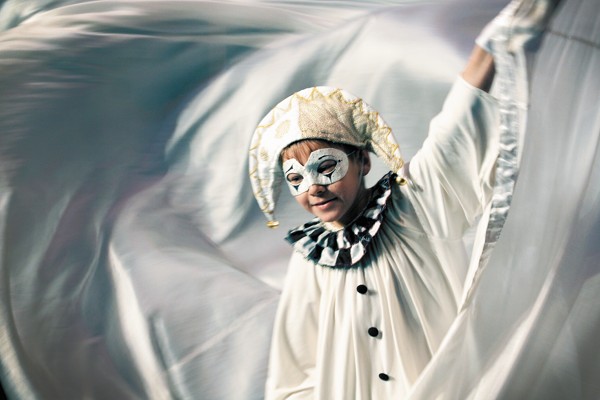
One only has to glance at the telephone book and see the address of the Piano theater to understand that it is out of the ordinary: Boarding School for the Deaf, Ankudinskoe Shosse, Nizhniy Novgorod. This unusual setting has a rather simple explanation: this is a theater in which the actors are pupils and residents of the boarding school. And although it might be lacking in repertory pillars and a regular schedule of performances, the theater is known and admired not only throughout the city but throughout the country as well. It would be difficult to imagine the region’s cultural life without the theater, and it would be difficult to imagine the theater without its founders – Vladimir and Marina Chikishev.
Theater as Family
He was an electrician who specialized in servicing car alarms. But his hear wasn’t really into technical work – he preferred pantomime, which he had fallen in love with as a child. She was a dreamer, who loved dance and drawing. As an adolescent she had seen a performance of mime Boris Amarantov and discovered this genre, deciding that pantomime was the way in which she perceives the world.
There is a chance that they could not have met or, even after having met, not created the theater – in 1986 the then 28-year-old Vladimir Chikishev took up a job at the boarding school for the deaf and together with his wife Marina thought up the pantomime theater Piano. This is a theater where the deaf children perform for all viewers, regardless of age or medical diagnosis, making them laugh and cry with their improvisations. From the moment of its founding, he has been the theater’s art director and stage director while she has been its chief costume and stage designer. They have two children: a son Daniil, who is now the executive director of the theater; and a daughter Nastya, who until recently was an actress and is now a teacher, sign language interpreter and artist. Even their spaniel Tosha goes with them to the theater every day as if to work.
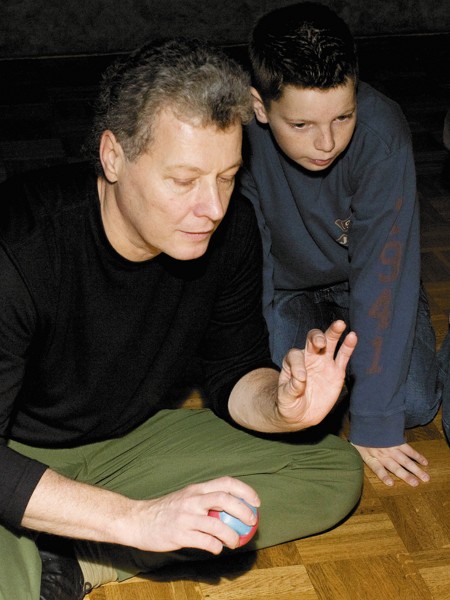
This February the theater is celebrating its 25th anniversary, and over these years much has transpired. The elder Chikishev long ago got a degree in drama theater directing at the Moscow University of Culture and was named an honored cultural worker and member of the Union of Theatrical Workers, and has headed up numerous projects. Marina has held quite a few master classes at international theater festivals and has worked with German colleagues as a costume designer. The Piano theater has welcomed and said farewell to hundreds of children, each of which despite their physical limitations had the opportunity to be real actors themselves and creators of their own scenarios. Thanks to the improvisational mastery that the Chikishevs teach so inspirationally and professionally, the Piano theater has won more than 40 awards at theater festivals in 11 different countries.
A Sandbox on Stage
Truth be told, it’s not clear which is better – to attend an official performance of the theater or to come to a repetition. Each of this and that is always something of a unique performance.
“We were quick to do away with the concept of a repertoire and set stage productions, as this would be senseless and impossible,” explains Vladimir Chikishev. “You can’t work with these children as you can with those that hear. A hearing child always has a larger reserve for creative expression. That means that you need to immediately compensate for this – not tomorrow by right now already! We aren’t up to making stage productions – it’s already something to create a situation similar to the sandbox when children play by themselves without the participation of adults. Our entire theater is focused on making a small child remember: he was at one point in time passionately engaged with something. And it is when he remembers this that the artist inside wakes up. It seems at first glance that the sandbox is a very simple task. But remember, most of these children from a very young age have lived in closed institutions, many have problems beyond just hearing, including memory problems, intellectual development issues, psychological problems. They do not know very many words and rarely perceive text as speech. They have trouble with lessons and must make a great effort. But this isn’t just the case with the deaf. Think of any children’s role in the theater. If we see a child on the stage, is most often a matter of him reciting a memorized text which is taken to be his own words. Adults see a template, which is perhaps why they are some amazed by the spontaneous Piano theater.”
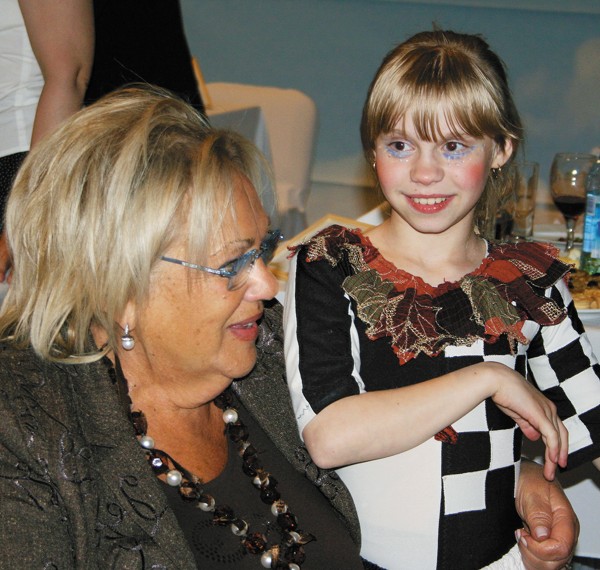
“We managed to gain some perspective on this ‘sandbox’,” says Chikishev. “We added some beautiful music, costumes and good lighting to this spontaneous improvisation – and an illusions is formed, a theater created. The conditionality inherent in the pantomime format also helps: you don’t need a wall, a bird, a boat, a tree – this can all be shown and seen. As a result this very same ‘sandbox’ was shown to a multitude of spectators – Russians, Germans, Americans, British… Only it was called a performance. But people afterward thanked us with tears in their eyes.”
The productions of Piano look quite contemporary. After all, we no longer read voluminous novels and are more comfortable with multimedia settings, with collages becoming the most recognizable form of art. But this theater never had major plots and histories – its performances are always a collage, a conversation on philosophical themes: Who are we? Who are others? What’s happening with us? And this is always a form a therapy for the actors, a psychological medicine for children which are considered invalids by society. Each of them becomes a magician on stage, turning one thing into another, creating endless metamorphoses with the help of their own bodies and imaginations. “Are they really deaf, or do they hear the music a little?” asked the surprised Nizhniy Novgorod Governor Valery Shantsev when he stopped by in December to congratulate the theater on its victory at the International Competition of Social-Cultural projects Initiatives – 2010. Yes, they are truly deaf. But they feel, see and live!
“When an actor goes through 10 or 20 metamorphoses in a short period of time, the rational part of the brain turns off, and a different hemisphere begins to work, a different logic,” explains Vladimir Chikishev. “As a result, the child has a different look, a different smile, and very different movements. People watch and say: what plasticity! But we don’t train plasticity and we are not focused on choreography. If, God forbid, we start to give movement directions, then they turn to us and expect instructions on what to do next. That is what is dangerous: that’s it, the ‘sandbox’ is gone! And perhaps forever.”
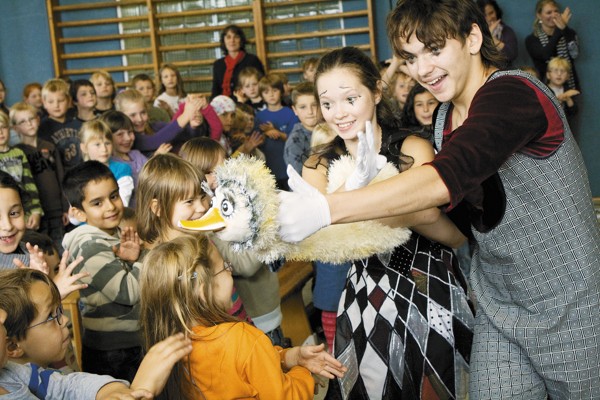
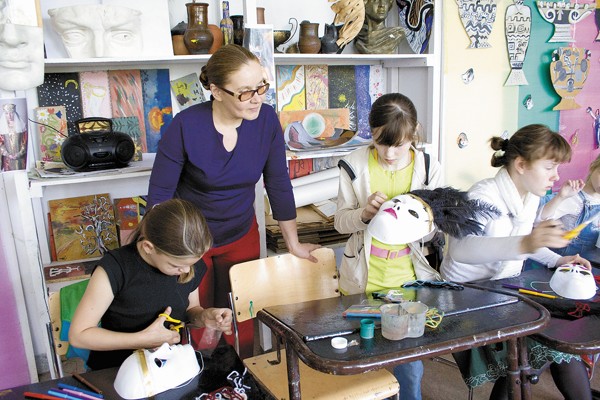
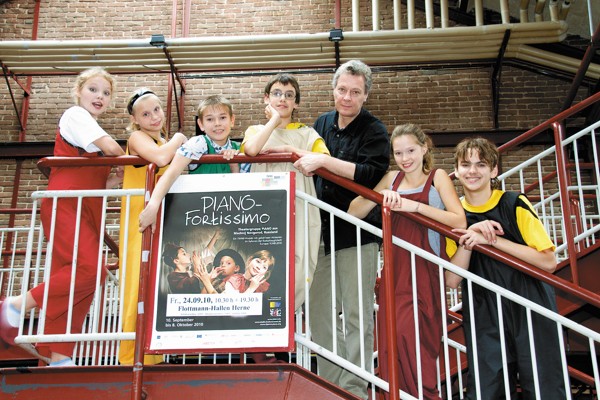
Rehearsals
“Hello! How’s life? Everything alright?” asks Vladimir, reinforcing his words with signing. The two boys – Kirill Trushov and Kirill Nagaev – are 11 years old. The spaniel Tosha also greets the with a wagging tail and receives a portion of petting before the boys set off to perform their “map dance”, cleaning the recently laid linoleum. And then they begin to warm up, getting out the “comets” (cloth balls with long “tails”), throwing them around, spinning and turning into comets themselves… Soon the “adults” come along: the eighth graders Ilya Galkin and Nastya Fadeeva and sixth graders Lena Zakharova and Anton Larionov. Each of them has had a difficult life. But in the theater isn’t difficult to say whether their work is thanks to or in spite of these circumstances.
On stage they all seem somehow connected: actor – invisible thread – actor – thread… And yes, one more thread leading up to the heavens. Pantomime where the actors really are deaf is so authentic. Perhaps this is why the Creator came up with this genre?
The theme of today’s repetition is “evaluation”. In philosophy this is a method of establishing the significance of something in the process of discovery. In theater, this is a method of showing this significance in the process of a game. How should one gaze, mimic, gesture? The expression is shown to imaginary partners, which can be large or tiny, stern or affectionate. The improvisation begins: Anton is playing with five dogs at once. Not the spaniel Tosha but five imaginary dogs, but what’s the difference? Through the imaginary the actor discovers the world…
How a Clown Grew Wings
It seems that Coelho once said something about traveling: as soon as someone arrives in an alien place, it is as if he has been born again. His perceptions are sharpened and he begins to rediscover the world. This is why traveling and “changing places” is important for everyone, and particularly for people.
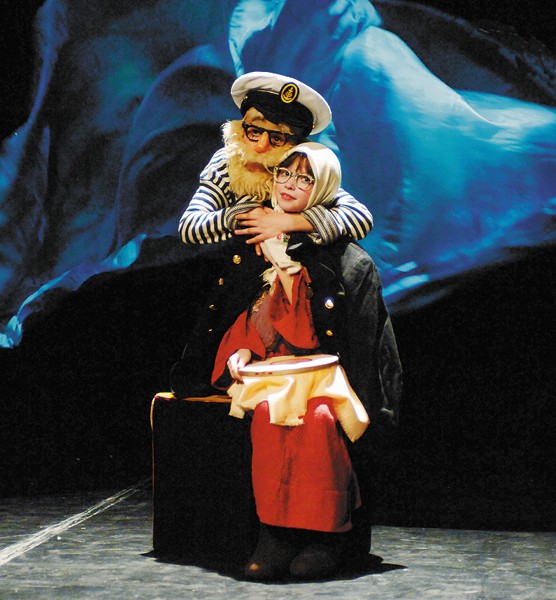
“During one month of touring you can do what you could not achieve in several years time in ordinary life,” Vladimir says. “The intensity of action plus new impressions, being outside their home plus an ocean of love from the audience – and the children are flying!”
In October 2012 the theater returned from a trip to Germany. Piano represented the Nizhniy Novgorod region in the international program of the Cultural Capital of Europe (which last year was Essen). Over the course of a month Wings for Clowns was performed in 13 cities throughout Germany and seen by 5000 spectators. The project was named one of the top ten projects of the 200+ projects presented within the Cultural Capital of Europe program.
Audience members are also participants of the performance, Wings for Clowns, Piano-Fortissimo Project, Essen, 2010 / Photo provided by the pantomime theater Piano
“I am often asked: when are you going to start doing something serious? They don’t understand that nothing could be more serious,” Chikishev says. “Having worked here, I see right through any adult performance like an x-ray. It’s such a joy to work with children!”
Watching those who act at the Piano, you don’t see deaf children, you see almighty giants, who can become forests, birds, sailboats, grandparents, musicians, angels… And then you understand that life also rarely speaks to us, and its gests and movements are light and accidental; life manipulates us like a pantomime manipulates his body. We sit in the chairs and thinking that this is a repetition, but in actuality we have long been awaited on stage.
Author: Valentina Perevedentseva




